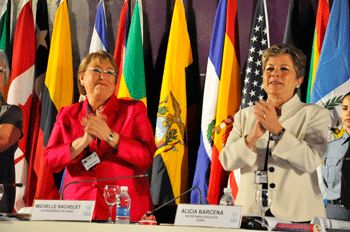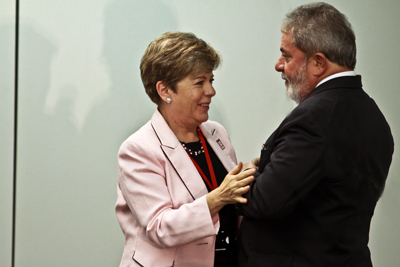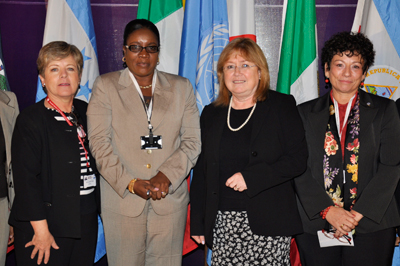New Social Covenant Needed to Achieve Equality between Women and Men in the Workplace
Women in Latin America and the Caribbean must conquer economic, physical and political autonomy for full recognition of their rights.

Watch live transmission of the Conference
(13 July 2010) Not only do women in Latin America and the Caribbean spend more time than men performing unpaid domestic or care work, but their total workload -including paid activities- is greater. What is more, they continue to face discrimination in the labour market and receive lower wages than men for the same work.
This issue is examined in the document What kind of State? What kind of equality? presented by ECLAC today at the Eleventh session of the Regional Conference on Women in Latin America and the Caribbean, being held from 13 to 16 July in Brasilia, Brazil.
The report reviews the achievements made and the challenges facing the governments of the region with regard to gender equality. "It will not be possible to achieve equality for women in the workplace until the burden of unpaid and care work which they have historically shouldered has been resolved. This calls for the establishment of a new virtuous equation that encompasses the State, the market and the family", said Alicia Bárcena, Executive Secretary of ECLAC, in presenting the document.
A compilation of studies measuring the total workload (paid and unpaid) of men and women in different countries in the region reveals two fundamental trends: (i) in all cases, total work time is greater for women than for men, and (ii) in all cases, women devote more of their time to unpaid work than men.
In Brazil, for example, women devote 56.6 hours per week to total work, compared to 52 hours for men. In Mexico, women spend a total of 76.3 hours working, whereas men spend only 58.4 hours.
Figures from 2008 show that 31.6% of women aged 15 or over in the region had no income of their own, while only 10.4% of men were in that position. More women than men were unemployed (8.3% compared with 5.7%) and, although the gender-wage gap has narrowed -women's average income rose from 69% of that of men in 1990 to 79% in 2008- women continue to be overrepresented in lower-income occupations and underrepresented in senior positions, and they still receive lower wages than men for work of equal value.
The ECLAC document emphasizes that work is the basis for gender equality and it is therefore essential for women to achieve economic, physical and political autonomy. Economic autonomy means having control over material goods and intellectual resources, as well as the capacity to make decisions about family income and assets.
Physical autonomy is also indispensable in order to overcome the barriers to exercising sexual and reproductive rights and women's physical integrity, while political autonomy implies gender-parity in decision-making, especially in government and parliament.
These three dimensions of autonomy are reflected in the data collected by the Gender Equality Observatory for Latin America and the Caribbean, whose findings thus far are set out in the ECLAC report What kind of State? What kind of equality?
The document emphasizes the need to raise awareness of the economic and social value of women's unpaid and care work in the region and the importance of empowering women to exercise their legitimate right to choice, so that they can participate under equal conditions in the labour market and in decision-making.
It proposes a strategy for advancing towards achievement of this equality based on three main pillars:
- The State as a guarantor of effective entitlement to rights
- Equality in both public and private spheres
- Redistribution of total work
Public policies are needed to rework the links between society's three basic institutions -the State, the family and the market- to forge a new social covenant for the redistribution of total work between men and women, in order to facilitate women's access to the labour market as part of their human rights.
The State must also take all the necessary steps, whether legislative, institutional, educational, health-related, fiscal or related to women's participation in decision-making, in order to eliminate gender biases and overcome wage gaps, segmentation and discrimination in the labour market.
Women's rights must be guaranteed in the labour market and within the family, so that they have the means to achieve the three types of autonomy discussed in the document. A solid institutional framework must also be built, with the appropriate regulatory capacity to ensure that those rights are respected.
A number of countries have offered examples of best practices by recognizing the value of unpaid and care work performed by women, either through constitutional reform (the Bolivarian Republic of Venezuela, the Dominican Republic, Ecuador and the Plurinational State of Bolivia) or through specific legislation or policies promoting gender equality in the workplace (Argentina, Brazil, Costa Rica, Chile, Mexico, Spain and Uruguay).
See also:
- Fact sheet. Redistribution of reproductive work: The blind spot in public employment policies
- Fact sheet: Women's unpaid work is an obstacle to achieving full equality
What kind of State? What kind of equality? is available on the website of the Eleventh session of the Regional Conference on Women in Latin America and the Caribbean.
For enquiries and interview requests, please contact in Brazil with Valderez Caetano, valderez.caetano@cdn.com.br ; telephones: (61) 3704-7660, (61) 81177518; Talita Sitta, talita.sitta@cdn.com.br ; telephones: (61) 91054870; or Cláudio Tourinho, tourinho@cdn.com.br ; telephones: (61) 37047660, (61) 81177313, from CDN Corporative Communication; or with the Public Information and Web Services Section of ECLAC. E-mail: dpisantiago@cepal.org ; tel: (56 2) 210 2040/2149.
Related content
Latin America and the Caribbean Countries Approve Action to Achieve Autonomy and Equality for Women
Support is also expressed for the creation of UN Women and the post-earthquake reconstruction efforts underway in Haiti and Chile.

Gender Equality Is the Road to Freedom and Democracy
Authorities and delegates from over 30 Latin American and Caribbean countries debate the challenges that need to be overcome in order for women to achieve full autonomy.

"Women Are Better at Channelling the Benefits of Social Programmes"
The President of Brazil received delegates to the Eleventh session of the Regional Conference on Women in Latin America and the Caribbean in Brasilia.

Women Must Be Placed at the Centre of Development for the Rebuilding of Haiti and Chile
Authorities and representatives of the United Nations discussed the challenges outstanding in this area at the Eleventh session of the Regional Conference on Women in Latin America and the Caribbean,…
Country(ies)
- Latin America and the Caribbean
-
Brazil
-
Mexico
Contact
Public Information Unit
- prensa@cepal.org
- (56 2) 2210 2040
